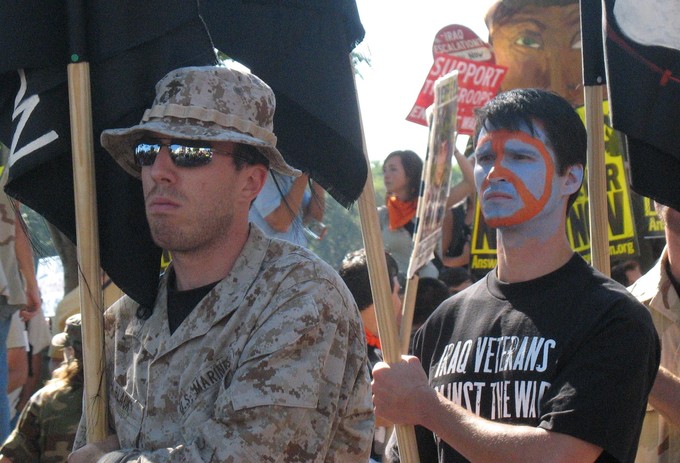On Veterans Day, Let’s Care for Veterans and Our Communities
By
Alliyah Lusuegro
Posted:
|
Military & Security

Photo courtesy of antiwar.march
This Veterans Day is a chance to make sure that we’re honoring the obligations we have to those this country has sent to war - and to see that as a model for the care and dignity we should extend to every person.
The United States is home to roughly 18 million veterans, which is just about one in fourteen adults.
At the National Priorities Project, when we look at spending on war and militarization, we also think about spending on veterans. We think of veterans’ programs as part of war spending because without wars - and without the most powerful standing army in history - there would be no veterans or veterans’ programs. And of course, the best thing we can do for our troops is to never send them to war in the first place.
We also mean that we should care for veterans - and the government does support this population. Veterans’ programs are far from perfect, but the services the government now provides for veterans could be a model for wider benefits that would make our families, communities, and country stronger.
The Department of Veteran Affairs received $135.4 billion in discretionary spending in 2023. Twenty years of war and endless deployments drove this spending up to three times what it was in 2001. This itself is a cost of war.
Veterans’ benefits include important needs such as for disability, subsidized education and training, health care and life insurance, career guidance, and housing assistance. Top businesses and retailers provide military discounts as well, including airlines like Delta Airlines and cell phone providers like T-Mobile.
No doubt the promise to care for this population can fall short - as in the case of mental health. Veterans have a higher suicide rate than civilians with 31.7 suicide deaths per 100,000 veterans per year compared to the 16.1 suicide deaths per 100,000 civilians, although some independent studies argue even higher rates. Check out our tradeoffs calculator to see how many veterans could receive medical care if we spent less on war and weapons.
The question also rises: Can we treat other communities with the same ideal of care that we do veterans? What if we had a national health care system that was open to everyone, not just those with military service and an honorable discharge? Such a system could benefit veterans and the rest of us, recognizing the dignity in each of us.
Or what would happen if our taxpayer dollars could make education more affordable for both veterans and those who don’t choose a military path? Or if any disability were recognized as worthy of recognition and assistance - not just those that result from combat?
Even though they often come up short, the U.S. has a good thing in its veterans’ programs. Veterans deserve this level of care and dignity - in fact, we all do.